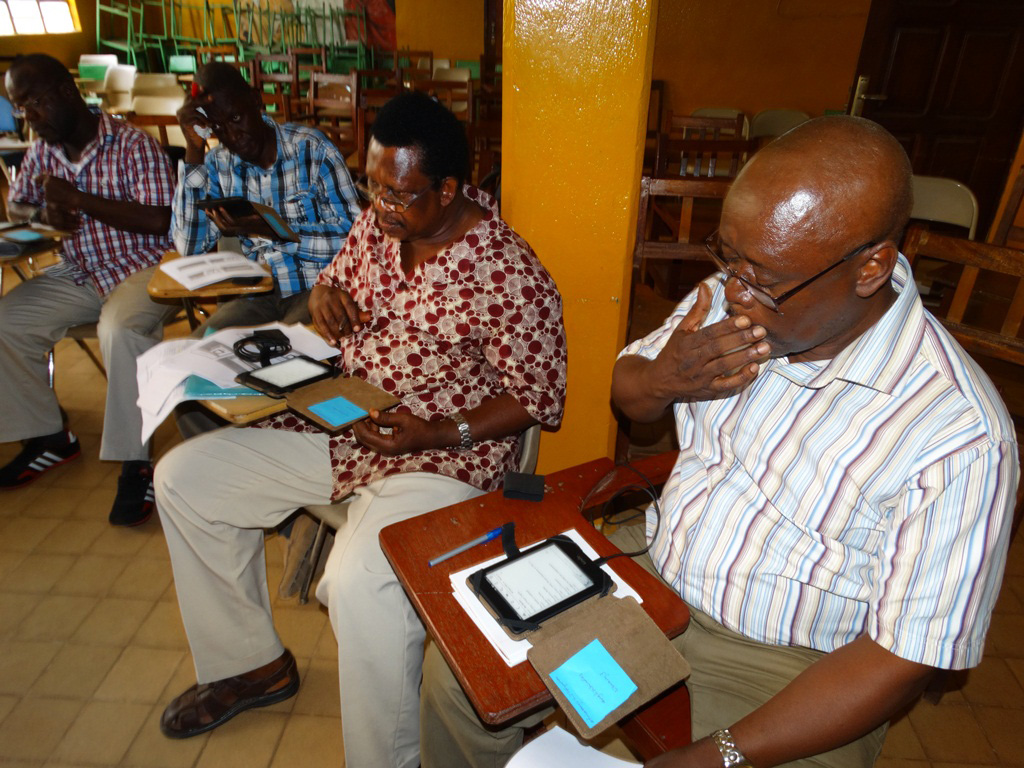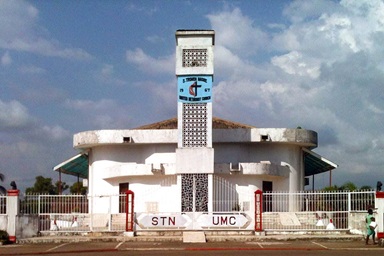In Sierra Leone, where core theological and academic resources are costly and often inaccessible, e-readers are opening new doors, offering affordable, easy access to learning materials for students and staff.
Theology faculty lecturers at the United Methodist-affiliated College of Theology and Management and Church Training Centre in Freetown, Sierra Leone, recently received e-readers to kick-start a new partnership with the E-Readers for Theological Education program of United Methodist Discipleship Ministries and the United Methodist Board of Higher Education and Ministry.
The church agencies are supplying the college with e-readers uploaded with texts. In this partnership, students and faculty will test the e-reader library as a means of improving theological education by providing greater access to core resources. An on-site project manager will work with the two agencies.

Theology tutors at the College of Theology and Management and Church Training Centre in Freetown, Sierra Leone, learn how to use their new e-readers. Photo by Phileas Jusu, UMNS.
Project goals include:
- Encouraging good stewardship of the e-readers and of the investment in the College of Theology and Management and Church Training Centre;
- Applying the e-readers in every way possible to enhance the education of students and the scholarship of faculty;
- Improving e-readers for theological education by evaluating existing content and identifying needed content;
- Collecting student book fees to help pay for the e-readers and content;
- Communicating regularly with the project coordinator about ongoing needs and challenges; and
- Participating with the two general church agencies in fund development as opportunity allows and in mutually agreed ways.
Discipleship Ministries and Higher Education and Ministry will coordinate the pilot project in three phases – faculty, student and evaluation – at the end of each school year in preparation for the following year. In addition, they will supply and expand e-reader library content within budget limits in response to needs and requests, and communicate with the on-site project manager about ongoing needs and challenges. The two agencies will coordinate a donor-based fund-development effort in 2016-19, the success of which is critical to the program’s viability.
DONATE OR LEARN MORE
Learn more or donate online to the E-Reader Project.
‘Very, very important to theology’
Robin Pippin, director of contextual resource development and distribution for Discipleship Ministries, and Julu Swen, the agency’s international representative in Africa, conducted training for theology faculty and distributed the first e-readers to staff. Each staff member will pay a minimal cost of $50 for the e-readers already uploaded with more than 200 theology books and other resources.
The team will return to Freetown later in the year to supply more e-readers and start an electronic book library for students. During the second phase, students will access e-readers in the library and will be charged a semester “book fee.” Students who faithfully pay the book fee will receive the e-readers as their library for ministry. After the first semester, the team will return for evaluation and improvement.
In 2012, Discipleship Ministries and Higher Education and Ministry experimented with the e-reader project at Gbarnga School of Theology in Liberia. The African Association of United Methodist Theological Institutions embraced the idea for all 16 United Methodist episcopal areas in Africa. Bishop Rodolfo Alfonso Juan of the Manila Episcopal Area asked Discipleship Resources to offer the same to United Methodist seminaries in the Philippines. Other partners such as Abingdon Press (United Methodist Publishing House) support the project by selling e-books at discounted prices.
The Rev. Silena Pratt, who teaches children’s ministry and pastoral counseling, described most of the materials as “very, very important to theology.”
“I love teaching counseling,” she said. “So, I went straight to look at pastoral care. It will help me more in teaching pastoral counseling. Usually I do research on the Internet and my textbooks to prepare to teach. Now the books are all here. If the lecturers and students make use of the e-reader, the learning process will be very effective and we will expect the students to excel.”
Although the regular library contains many theology resources, Pratt said the students usually do not have time to study on campus. With the e-readers, they can stay at home, read and do their schoolwork.
Jusu is a communicator for The United Methodist Church in Sierra Leone.
News media contact: Vicki Brown at (615) 742-5470 or [email protected]
Like what you're reading? Support the ministry of UM News! Your support ensures the latest denominational news, dynamic stories and informative articles will continue to connect our global community. Make a tax-deductible donation at ResourceUMC.org/GiveUMCom.




